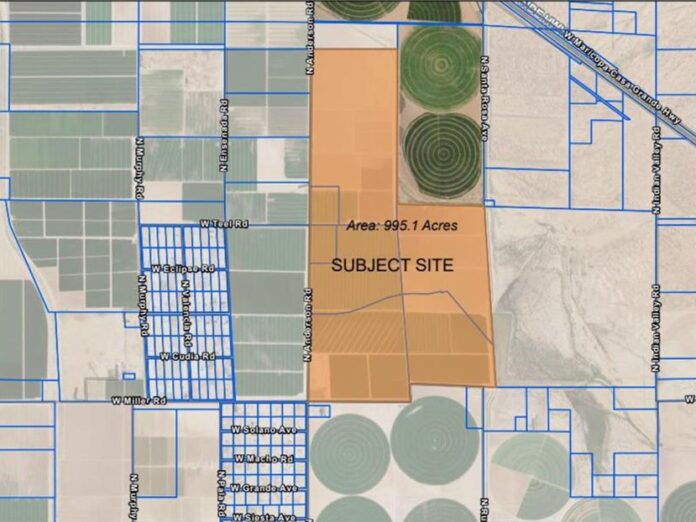
The Maricopa Planning and Zoning Commission on Monday approved an amendment to the city’s General Plan Future Land Use Map from undesignated land use to Master Planned Community, clearing the way for the Santa Cruz Ranch project to move forward to review by the city council.
In total, Santa Cruz Ranch includes 1,886 acres. Of that, 891 acres already have been zoned for master planned community, which can include residential, mixed-use, commercial, and light industrial uses. When completed, the Santa Cruz Ranch project could be the site of more than 6,600 homes and 17,000 people.
About 40 residents of the area attended the meeting to voice their opposition to the project. The primary objections were water usage, the encroachment of development on the rural lifestyle the residents of the area have chosen, and traffic.
Dave Klingensmith of Stanfield raised the water issue and said he is concerned with Global Water using groundwater to meet its 100-year assured water supply commitment and the drop in the water table that could come from pumping that water to supply Santa Cruz Ranch.
He cited an Arizona Department of Water Resources report that stated that the water table would drop an average of 8.87 feet per year, which would jeopardize many of the wells residents currently rely on for their water.
“In 5-10 years if (the water table level) drops 8.87 feet per year, our wells are going to be dry unless we re-drill,” Klingensmith said. “So that is a real concern.”
He urged the commission to consider lowering the density of homes per acre or other tactics to limit the amount of water required for the project.
“Water is a limited resource, it’s non-replaceable and once you build homes, you’re kind of stuck.”
During his presentation, Jason Sanks, a partner with Iplan Consulting, pointed out that agricultural land typically uses about three times the water as residential use, which would mitigate many of the concerns Klingensmith voiced.
Kenneth Cardon, also of Stanfield, said the new development will be directly across the street from Santa Cruz Ranch, and he thinks traffic will be a major problem.
“What happens when everybody who commutes into Maricopa or Chandler needs to get out?” he said. “What happens when there’s an emergency when your wife is having a baby? These 6,000 people are going to clog this area with congestion. You have 6,000 people leaving and you have 6,000 people trying to come back home, that’s going to cause issues.”
He also raised the issue of the city of Maricopa rezoning much of the land that is currently slated for commercial use, to residential.
“What happens when all that land that could be zoned commercial land is gone?” he asked. “They don’t want this to be a commuter town, then leave us land we can zone commercial, so we have all that infrastructure, and we don’t have to be a commuter town.
“If we continue building these homes, and we continue building all these developments, and keep giving away all this land, what is left for the city of Maricopa to build to not be a commuter town. It’s just not going to happen.”
Commissioner Dan Frank said he was unsure about whether Santa Cruz Ranch was right for the area.
“I don’t know how I really feel about this project,” he said. “There’s all kinds of challenges with this particular piece of land, everything from the flood plain to water, to the airport – everything. “To me the argument that the remedy for the area is building a master planned community, that doesn’t make sense. I don’t think this is the right land use for this area.”
Despite the public objections, the commission voted 5-2 to approve the project, with Frank and Bill Robertson voting against the project.
The next step will be review by the city council. The planning and zoning commission provides a recommendation to the council based on whether a development project meets the zoning and usage requirements of the city for their specific area. The city council then grants or denies final approval to the developers. The council is not bound by the commission’s recommendations.





![Maricopa’s ‘TikTok Rizz Party,’ explained One of several flyers for a "TikTok rizz party" is taped to a door in the Maricopa Business Center along Honeycutt Road on April 23, 2024. [Monica D. Spencer]](https://www.inmaricopa.com/wp-content/uploads/2024/04/spencer-042324-tiktok-rizz-party-flyer-web-218x150.jpg)






![Alleged car thief released without charges Phoenix police stop a stolen vehicle on April 20, 2024. [Facebook]](https://www.inmaricopa.com/wp-content/uploads/2024/04/IMG_5040-218x150.jpg)





Just wait until buyers start to buy in this community without researching, then realize it’s in direct flight path of an airport…